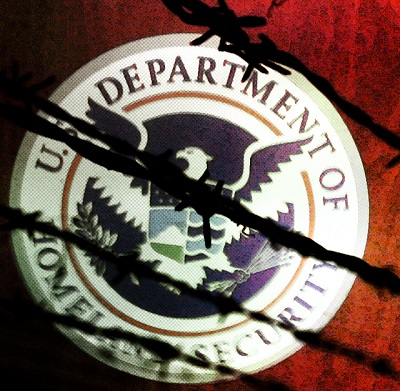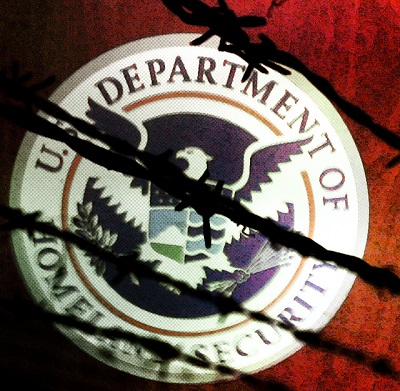
Truthout is a vital news source and a living history of political struggle. If you think our work is valuable, support us with a donation of any size.
 (Image: Jared Rodriguez / Truthout; Adapted: Wesley Fryer, Allie_Caulfield)It’s time to do away with the word “homeland.”
(Image: Jared Rodriguez / Truthout; Adapted: Wesley Fryer, Allie_Caulfield)It’s time to do away with the word “homeland.”
As the situation with ISIS continues to escalate, and as worries about terrorist attacks on US soil continue to spread, we’re hearing the term “homeland” mentioned more and more.
Ever since it first stole the spotlight with the creation of the Department of Homeland Security in the months after 9/11, the term “homeland” has become ingrained in US society.
But, as Chris Matthews pointed out on his MSNBC show recently, there’s something strange and creepy about the term.
Matthews said that, “It’s a term used by the neocons, they love it. It suggests something strange to me. Like who else are we defending except America? Why don’t you just say ‘America’? Why doesn’t [Obama] say we defended against attacks against this country? As if we’re facing some existential Armageddon threat from these people. Do you buy the phrase ‘homeland’? I never heard it growing up, never heard it in my adulthood. It’s a new word. Why are we using it? Is there some other place we’re defending? What are we talking about when we say ‘homeland’? What’s it about?”
While Chris has really hit the nail on the head when it comes to the term “homeland,” it’s important that you know, as Paul Harvey used to say, “the rest of the story” behind this “strange” term.
First, it’s really not a new word at all.
In fact, it’s been around for a very long time and has a very dark history.
As Josh Marshall over at Talking Points Memo pointed out, the term homeland, “really does have a deep blood and soil tinge to it which is distinctly Germanic, more than a touch un-American, and a little creepy.”
That “blood and soil” that Marshall is referring to was one of the really big slogans of Hitler’s Nazi Germany. “Blood and soil – we Germans are the products of this earth, we are a race unique from all others.”
Perhaps ironically, Hitler stole the term “homeland” from the 1920s and 1930s Zionist movement’s goal to create a Jewish “homeland” in the Middle East, Hitler wanted to create a “racial” identity for the German people that was tied to German soil.
He wanted to create an identity that went beyond language and culture. He wanted to invent a “German race,” and have Germany be that race’s “homeland,” all so he could sell to the German people their own racial superiority and use that to justify exterminating others.
So, in 1934, at the Nazi party’s big coming-out event, the famous Nuremberg rally, Nazis introduced the term “homeland.”
Prior to that, they’d always referred to Germany as “the Fatherland” or “the Motherland” or “our nation.”
But Hitler and his think-tank wanted Germans to think of themselves with what he and Goebbels viewed as the semi-tribal passion that the Zionists had for Israel.
So, in that most famous 1934 Nazi rally’s opening speech, Rudolph Hess, Hitler’s deputy Fuhrer, said that, “Thanks to [Hitler’s] leadership, Germany will become the homeland. Homeland for all Germans in the world.”
Of course, that’s the translated version. “Homeland” in German is “heimat.”
“Heimat” was used throughout the reign of Hitler and throughout World War II.
Nazi’s loved the word, and attached it to everything they could, like the “Nazi Homeland Defense Forces,” or the Heimwehr.
But, immediately after Nazi Germany was defeated and World War II came to a close, the word all but disappeared from German vernacular.
Post-war Germans were ashamed to use a word that stood for such terrible things.
Fast-forward nearly 70 years, and while Germans still won’t say it, the word “homeland” is everywhere in the United States. Bush and Cheney rolled it out in a big way after 9/11, and our media managed to completely ignore the dark history of the word.
But it’s a history that carries with it a danger – the danger that we may begin to think of ourselves as an “exceptional” people, a “race apart” because of our national identification. That we may start to think of the United States as a “homeland.”
It’s time to retire this artifact of the Nazi era.
Let’s rename the Department of “Homeland” Security, and remove from the United States’ self-description this dark, strange and creepy term.
A terrifying moment. We appeal for your support.
In the last weeks, we have witnessed an authoritarian assault on communities in Minnesota and across the nation.
The need for truthful, grassroots reporting is urgent at this cataclysmic historical moment. Yet, Trump-aligned billionaires and other allies have taken over many legacy media outlets — the culmination of a decades-long campaign to place control of the narrative into the hands of the political right.
We refuse to let Trump’s blatant propaganda machine go unchecked. Untethered to corporate ownership or advertisers, Truthout remains fearless in our reporting and our determination to use journalism as a tool for justice.
But we need your help just to fund our basic expenses. Over 80 percent of Truthout’s funding comes from small individual donations from our community of readers, and over a third of our total budget is supported by recurring monthly donors.
Truthout has launched a fundraiser to add 310 new monthly donors in the next 4 days. Whether you can make a small monthly donation or a larger one-time gift, Truthout only works with your support.